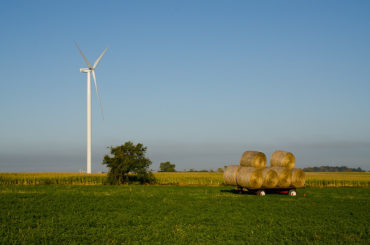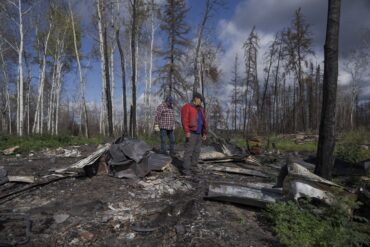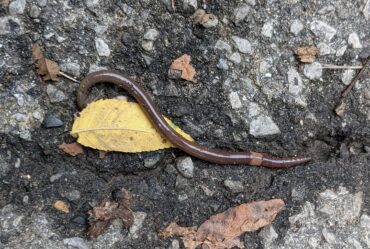-
 Climate ChangeLake ErieLatest NewsNewsRecreation and TourismRecreational Hunting and FishingScience, Technology, ResearchTourism
Climate ChangeLake ErieLatest NewsNewsRecreation and TourismRecreational Hunting and FishingScience, Technology, ResearchTourismLake Erie is 13% frozen, expect less freezing in the future
-The National Oceanic and Atmospheric Administration said ice on the Great Lakes decreased by 5% each decade for 50 years.
00 -
 Climate ChangeFeature HomepageHabitat RestorationIndustry, Energy, Economic DevelopmentInfrastructureLatest NewsMichiganNewsScience, Technology, ResearchWater Quality and Restoration Efforts
Climate ChangeFeature HomepageHabitat RestorationIndustry, Energy, Economic DevelopmentInfrastructureLatest NewsMichiganNewsScience, Technology, ResearchWater Quality and Restoration EffortsElk Rapids wants to help its shoreline through new state Climate Corps program
-Michigan is working with communities and organizations to tackle climate change by funding new staff positions.
-
 Charles Stewart Mott Foundation PartnershipClimate ChangeCollaborationEnergy, Clean Energy, Ethanol and FrackingIndustry, Energy, Economic DevelopmentLatest NewsMichiganNewsPolitics, Policy, Environmental JusticeScience, Technology, Research
Charles Stewart Mott Foundation PartnershipClimate ChangeCollaborationEnergy, Clean Energy, Ethanol and FrackingIndustry, Energy, Economic DevelopmentLatest NewsMichiganNewsPolitics, Policy, Environmental JusticeScience, Technology, ResearchMichigan lawmakers have more energy priorities in 2024
-Michigan lawmakers made sweeping changes to Michigan energy laws last fall. But plenty of items missed the cut, from community solar to finding solutions for Michigan’s outage-prone power grid.
-
 Climate ChangeDetroitFeature DetroitIndustry, Energy, Economic DevelopmentLatest NewsMichiganNewsProtectScience, Technology, Research
Climate ChangeDetroitFeature DetroitIndustry, Energy, Economic DevelopmentLatest NewsMichiganNewsProtectScience, Technology, ResearchWhy poor air quality isn’t just a summer problem in Detroit
-“Atmospheric inversions” caused several days of polluted air this week in much of Michigan’s Lower Peninsula, though it did not rise to the level of an air quality action alert.
-
 APClimate ChangeFeature HomepageIndustry, Energy, Economic DevelopmentLatest NewsNewsPolitics, Policy, Environmental JusticeScience, Technology, Research
APClimate ChangeFeature HomepageIndustry, Energy, Economic DevelopmentLatest NewsNewsPolitics, Policy, Environmental JusticeScience, Technology, ResearchCarbon pollution is down in the US, but not fast enough to meet Biden’s 2030 goal, new report says
-Climate-altering pollution from greenhouse gases declined by nearly 2% in the United States in 2023, even as the economy expanded at a faster clip, a new report finds.
-
 Climate ChangeEnbridge Line 5 and Other PipelinesFeature HomepageIndustry, Energy, Economic DevelopmentLatest NewsMichiganNewsScience, Technology, Research
Climate ChangeEnbridge Line 5 and Other PipelinesFeature HomepageIndustry, Energy, Economic DevelopmentLatest NewsMichiganNewsScience, Technology, ResearchTraverse City-based policy center appeals Michigan’s Line 5 permit
-The nonprofit For Love Of Water, which was an intervenor in the case, says the commission’s decision violates the Michigan Environmental Protection Act.
-
 Climate ChangeFeature HomepageLake MichiganLatest NewsNewsRecreation and TourismScience, Technology, Research
Climate ChangeFeature HomepageLake MichiganLatest NewsNewsRecreation and TourismScience, Technology, ResearchWarmer winters mean less ice on Lake Michigan – hurting lake trout and whitefish
-All of the Great Lakes are experiencing declining ice coverage in the winter, which could affect recreation and shorelines.
-

As Great Lakes warm, collaboration and Indigenous self-determination are keys to adapting
-The Great Lakes are among the fastest-warming bodies of water. They contain one fifth of the world’s freshwater, and climate change is affecting everything that depends on them.
-

Canada says it can fight climate change and be major oil nation. Massive fires may force a reckoning
-Thousands of wildfires in Canada this year have incinerated an area larger than Florida, releasing into the atmosphere more than three times the amount of carbon dioxide that is produced by Canada in an entire year. And some are still burning.


